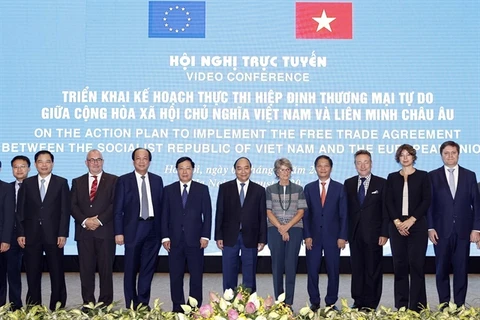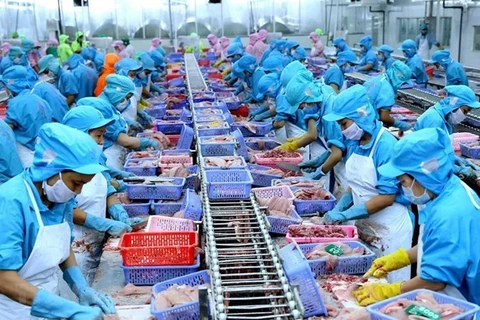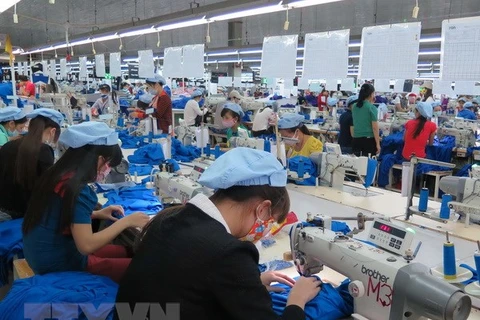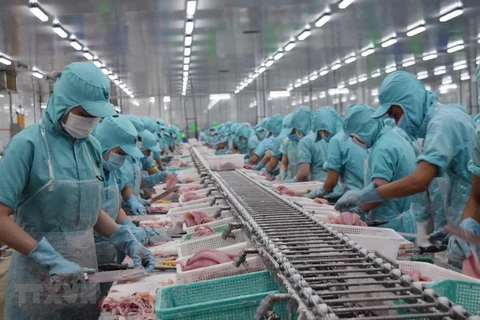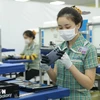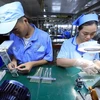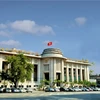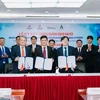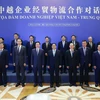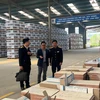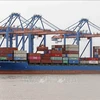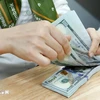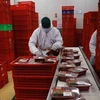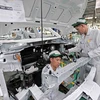Hanoi (VNA) - Having recognised the advantages for exports created by the EU-Vietnam Free Trade Agreement (EVFTA), Hanoi has designed a number of measures to make full use of the opportunities it brings about.
Addressing an online conference on implementing a plan to bring the EVFTA to life, a representative from the Hanoi People’s Committee noted that as many as 23 of the 27 EU member countries have invested in Hanoi, with total investment now standing at 4.16 billion USD, or nearly 10 percent of the total of 46 billion USD in foreign investment in the city.
EU enterprises primarily invest in support industries and high-tech production.
Meanwhile, the EU market receives 12-15 percent of Hanoi’s export products each year, mostly footwear, fruit and vegetables, and electronics.
In the first seven months of this year, Hanoi’s exported 998 million USD worth of goods to the EU, down 2.5 percent over the same period last year due to the impact of the COVID-19 pandemic.
Economists said that the 500-million-strong EU market, with annual GDP of 18 trillion USD, holds substantial promise for Vietnam in general and Hanoi in particular. The EU is also an important trade partner of Vietnam, with two-way trade standing at 55.8 billion USD in 2018.
Considered the “most modern, comprehensive, and ambitious agreement ever concluded between the EU and a developing country”, the EVFTA will abolish almost all tariffs between the two sides over the next ten years.
With commitments to open up markets and remove nearly 100 percent of import taxes, the EVFTA is expected to bring about major opportunities for businesses in Vietnam and Hanoi. Experts have forecast that revenue from exports to the bloc will rise about 42 percent by 2025 and nearly 45 percent by 2030.
According to a representative from the Ministry of Industry and Trade, Vietnam and the EU can supplement each other in goods supply and many Vietnamese products are already held in high regard in the EU market.
Based on the analysis, Hanoi has determined that the implementation of the EVFTA will promote growth in trade between Vietnam’s capital and the EU.
The EU, however, is quite a fastidious market and this requires exporters to ensure product quality and meet strict requirements on production processes and the use of labour. Along with quality, economists pointed out that EU consumers pay great attention to businesses’ social responsibility. Factors like not using child labour or regularly hosting charity activities and supporting the local community can contribute to enhancing the value of products in the market.
In order to conquer any market, Hanoi will need to increase its communications efforts and support enterprises by providing them with guidelines on standards for the entire production process, therefore helping local companies improve their competitiveness and access more export opportunities.
The capital will also continue to promote administrative reform and engage in investment promotion programmes calling for EU investors, especially in pharmaceuticals and sectors seeking high technology.
Hanoi has recently given support to small and medium-sized enterprises and start-ups to strengthen connectivity in building a start-up ecology and to create partnerships with the capital cities of certain EU member countries.
The city has proposed that the Prime Minister issue a plan to implement the EVFTA and direct ministries, sectors, and agencies to provide guidelines to cities and provinces, including Hanoi, to effectively bring the agreement to life, thus increasing export opportunities for businesses in Hanoi and Vietnam as a whole.
Over the years, under the Prime Minister’s direction, the capital has implemented plans to promote investment ties and partnerships with EU member countries, especially localities with which it shares a traditional relationship./.
VNA

